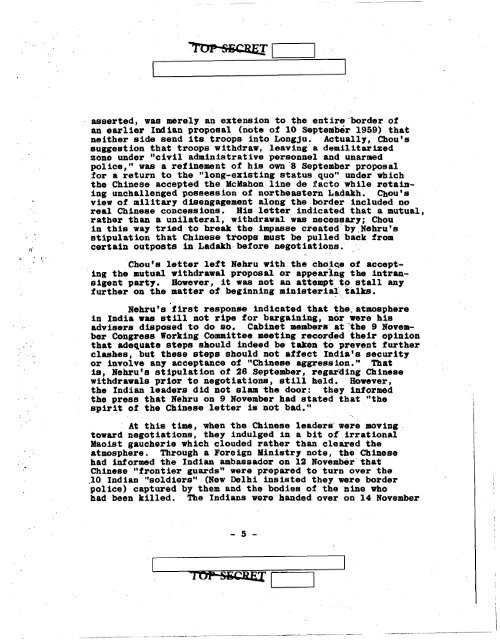The Sino-Indian Border Dispute Section 2: 1959-61 - The Black Vault
The Sino-Indian Border Dispute Section 2: 1959-61 - The Black Vault
The Sino-Indian Border Dispute Section 2: 1959-61 - The Black Vault
Create successful ePaper yourself
Turn your PDF publications into a flip-book with our unique Google optimized e-Paper software.
. .<br />
1<br />
asserted, was merely an extension to the entire border of<br />
an earlier <strong>Indian</strong> proposal (note of 10 Septerdber <strong>1959</strong>) that<br />
neither side send its troops into LongJn. Actually, Chouts<br />
suggestion that troops withdraw, leaving a demilitarized<br />
zone under "civil administrative personnel and unarmed<br />
police,*' was a refinement of his own 8 September proposal<br />
for a return to the "long-existing status quo" under which<br />
the Chinese accepted the McMahon line de facto while retaining<br />
unchallenged possession of northeastern Ladakh. thou's<br />
view of military disengagement along the border included no<br />
real Chinese concessions. His letter indicated that a mutual,<br />
rather than a unilateral, withdrawal was necessary; Chou<br />
in this way tried to break the impasse created by.Nehru's<br />
stipulation that Chinese troops must be pulled back from<br />
9; certain outposts in Ladakh before negotiations.<br />
. .<br />
, .<br />
..<br />
-.<br />
Chou's letter left Nehru with the choice of accepting<br />
the mutual withdrawal proposal or appearhg the intransigent<br />
party. Eowever, it was not an attempt to stall any<br />
further on the matter of beginning ministerial talks.<br />
Nehru's 'first response indicated that the. atmosphere<br />
in India was still not ripe for bargaining, nor were his<br />
advisers disposed to do so. Cabinet PaernberS at 'the 9 November<br />
Congress Working Committee meeting recorded their opinion<br />
that adequate steps should indeed be taken to prevent further<br />
clashes, but these steps should not affect India's security<br />
or involve any acceptance of "Chinese<br />
That<br />
ia, Nehru's stipulation of 26 September, regarding Chinese<br />
withdrawals prior to negotiations, still held. However,<br />
the <strong>Indian</strong> leaders did not slam the door: they iniormed<br />
the press that Nehru on 9 November had stated that "the<br />
spirit of the Chinese letter is not bad."<br />
At this time, when the Chinese leaders were moving<br />
toward negotiations, they indulged in a bit of irrational<br />
Maoist gaucherie which clouded rather than cleared the<br />
atmosphere. Through a Foreign Ministry note, the Chinese<br />
had informed the <strong>Indian</strong> ambassador on 12 November that<br />
Chinese "frontier guards" were prepared to turn over the<br />
.10 <strong>Indian</strong> "soldiers" (New Delhi insisted they were border<br />
police) captured by them and the bodies of the nine who<br />
had been killed. <strong>The</strong> <strong>Indian</strong>s were handed over on 14 November<br />
-5-





![Combat Support in Korea [270 Pages] - The Black Vault](https://img.yumpu.com/49796461/1/190x71/combat-support-in-korea-270-pages-the-black-vault.jpg?quality=85)











